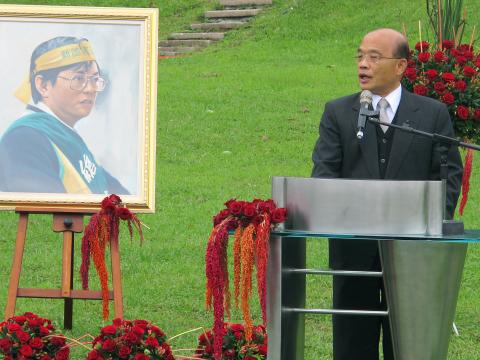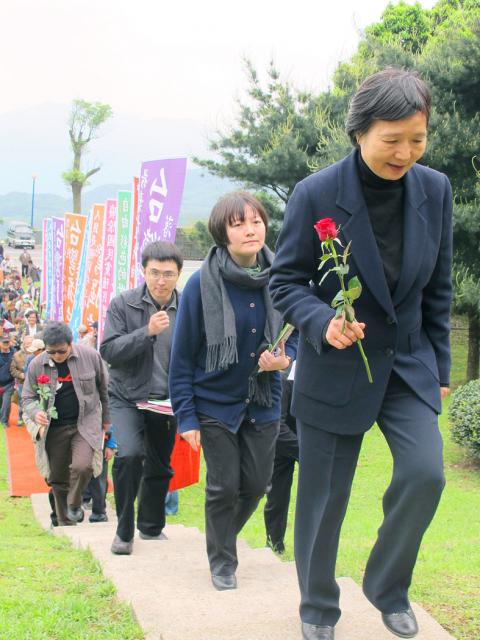|
Freedom in Taiwan has
regressed: DPP chairman
HARD-WON: The chairman said it was a hard
journey to winning the right of freedom of speech and it was made possible by
people like activist Deng Nan-jung
By Rich Chang / Staff reporter

Democratic Progressive Party (DPP)
Chairman Su Tseng-chang speaks at an event in New Taipei City’s Chinshan
District commemorating democracy activist Deng Nan-jung, who killed himself by
self-immolation in his Taipei office in 1989 in protest against charges of
sedition for his calls on the government to protect freedom expression.
Photo: Yu Chao-fu, Taipei Times

Ye Chu-lan, right, the widow of
pro-democracy activist Deng Nan-jung, and their daughter Deng Chu-mei, prepare
to lay down a rose at an event commemorating Deng Nan-jung’s self-immolation in
his office in 1989 in protest against charges of sedition for his calls on the
government to protect freedom expression.
Photo: Yu Chao-fu, Taipei Times
Democratic Progressive Party (DPP)
Chairman Su Tseng-chang (蘇貞昌) yesterday said that freedom in Taiwan has
regressed since “a repressive government” had returned to power.
Su made the remarks at a ceremony in honor of Deng Nan-jung (鄭南榕), the late
democracy advocate who set himself on fire 24 years ago and died in defense of
“100 percent freedom of expression.”
The event took place at Deng’s tomb in New Taipei City’s (新北市) Jinbaoshan
Cemetery in the morning.
Su said it was a hard journey for Taiwanese to win the right of freedom of
speech and it was made possible by people like Deng, who sacrificed himself.
Saying that 24 years ago there was no freedom in Taiwan under the
then-authoritarian Chinese Nationalist Party (KMT) government, Su said people
who had suffered from political repression or harassment knew that “certain
words are said at home, not outside, or you could disappear or be caught
anytime.”
However, Deng did not keep his mouth closed due to fear or threats, instead he
spoke out, Su said.
Deng spoke out not only with his mouth, but also by publishing his writings, he
said.
He added that although Deng’s magazine Freedom Era Weekly (自由時代週刊) was banned,
and permission for publishing the weekly was suspended again and again, he
reapplied repeatedly and never gave up his intention in pursue democracy and
freedom for the country.
Deng requested the authoritarian government to lift martial law, mark Feb. 28 an
official memorial day for the 228 Massacre, and asked for a total freedom of
expression, Su said.
He added that the KMT’s seizure, investigation, detention and imprisonment of
Deng was intended to challenge his determination.
However, the KMT did not succeed, and it charged him with treason.
“Twenty-four years later, as we enjoy democracy and freedom of expression, we
should not forget Deng’s spirit and the difficult road we have traveled,” Su
said.
“After we have democracy, people voted for the then-authoritarian governors and
allowed them to retain their power,” Su said.
Now they used more delicate and sophisticated ways to oppress freedom and
democracy, Su said.
Freedom in Taiwan has been regressing since the KMT returned to power in 2008,
and the US-based Freedom House has also said that freedom of the press in Taiwan
has regressed, Su said.
Government propaganda is brainwashing people by saying that everything in China
is good, while everything Taiwanese is bad, Su said.
Dealing with the situation, “people should appreciate what we own and learn to
make right judgements,” Su added.
Born in Taiwan in 1947 to a family from China, Deng on numerous occasions in the
1980s overtly articulated his support for Taiwanese independence, at a time when
a charge of sedition was in place to indict proponents of independence.
He established Freedom Era Weekly in 1984.
On April 7, 1989, he set himself on fire as heavily armed police attempted to
break into his Taipei office, where he had barracaded himself for 71 days after
he was charged with sedition for his magazine’s anti-government stance and for
publishing a draft “Republic of Taiwan constitution” in 1988.
|
![]()
![]()
![]()